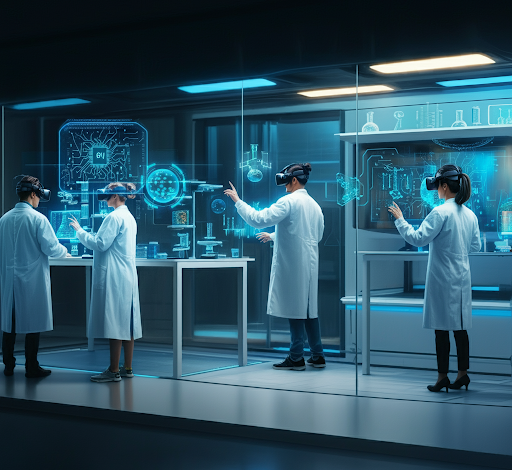
The world of science is no stranger to revolution. From the telescope to the microscope, tools have always shaped our understanding of the universe. Today, we stand at the cusp of another transformative leap, powered by generative artificial intelligence (GenAI). This technology, with its uncanny ability to learn, create, and innovate, is poised to redefine the very fabric of scientific discovery. Imagine a world where tedious data analysis is automated, freeing up researchers to focus on the “aha!” moments. Imagine algorithms that don’t just analyze existing data but generate entirely new hypotheses, pushing the boundaries of knowledge beyond human intuition. This is the promise of GenAI for scientific discovery, and it’s closer than you might think.
Beyond Human Limitations
One of the biggest challenges in science is the sheer volume of data. From genomics to astronomy, researchers are drowning in information, struggling to extract meaningful insights. GenAI offers a lifeline. Machine learning models can sift through mountains of data, identifying patterns and anomalies that would take humans years to uncover. This accelerates the pace of research, allowing scientists to focus on interpretation and experimentation.
But GenAI goes beyond mere analysis. Generative models, like those behind stunning AI art and fluent chatbots, can create. In a scientific context, this means generating novel molecules for drug discovery, designing innovative materials with specific properties, or even simulating complex biological systems to understand disease progression.
Think of it like this: if traditional AI is a master chef meticulously following a recipe, GenAI is a culinary artist, experimenting with flavors and textures to create entirely new dishes. This creative capacity is what sets GenAI apart and unlocks its true potential for scientific breakthroughs.
Real-World Applications: Let’s take a glimpse into the Future
The impact of GenAI is already being felt across diverse scientific fields:
- Drug Discovery: GenAI is accelerating the search for new drugs by generating novel molecular structures with desired properties. This can significantly reduce the time and cost of bringing life-saving medications to market. Imagine AI designing personalized cancer treatments tailored to an individual’s genetic makeup.
- Materials Science: Scientists are using GenAI to design materials with specific characteristics, such as strength, flexibility, or conductivity. This could lead to the development of revolutionary materials for everything from aerospace engineering to renewable energy.
- Climate Modeling: GenAI can analyze vast climate datasets and generate complex simulations to predict future climate scenarios with greater accuracy. This information is crucial for developing effective mitigation and adaptation strategies.
- Genomics: GenAI is helping researchers decipher the complex code of life, identifying disease-causing mutations, and predicting the effects of genetic variations. This could pave the way for personalized medicine and gene editing therapies.
Navigating the Challenges
While the potential of GenAI is undeniable, there are challenges to address:
- Data Bias: Like any AI, GenAI models are only as good as the data they are trained on. Biased data can lead to inaccurate or misleading results, highlighting the need for diverse and representative datasets.
- Interpretability: Understanding how GenAI models arrive at their conclusions can be challenging. Researchers are developing techniques to make these “black boxes” more transparent, ensuring that scientific discoveries are grounded in sound reasoning.
- Ethical Considerations: As with any powerful technology, GenAI raises ethical questions. How do we ensure responsible use? How do we prevent misuse? These are questions that scientists, policymakers, and society as a whole must grapple with.
The Road Ahead: A Collaborative Future
The future of scientific discovery lies in collaboration. GenAI is not meant to replace scientists but to empower them. By automating tedious tasks, generating novel hypotheses, and providing new tools for exploration, GenAI frees up human ingenuity to focus on what it does best: asking questions, interpreting results, and pushing the boundaries of knowledge. Imagine a world where scientists and AI work hand-in-hand, each complementing the other’s strengths. This synergistic partnership holds the key to unlocking a new era of scientific discovery, where breakthroughs happen faster, solutions are more innovative, and the mysteries of the universe are revealed at an unprecedented pace. GenAI is not just a technological advancement; it’s a catalyst for human progress. By embracing its potential, we can accelerate our journey towards a deeper understanding of the world around us and unlock a future filled with scientific marvels.

